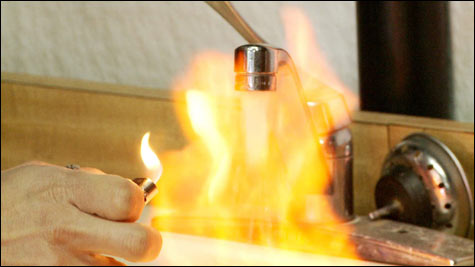
DO NOT DRINK THIS Contaminated tap water lights up in Gasland. |
Recently shortlisted for next year's Best Documentary Feature Oscar, and screening at SPACE Gallery on December 16, Josh Fox's Gasland feels, in a way, like the first hipster environmental documentary. It is self-aware, deadpan but sober of mind, and not a terribly rigorous piece of investigative journalism. But it doesn't really need to be. Much of Gasland's great success hinges on — and this is probably the hippest thing about it — the relative obscurity of its subject, which is hydraulic fracking, a means of extracting natural gas that relies on a dangerous cocktail of many hundreds of unpronounceable chemicals and chemical compounds.
Most of us know we should give more of an active shit about the subjects of your typical eco-doc — our industrial food system (Food, Inc.), global warming (An Inconvenient Truth, Cool It, et al. ad nauseam) — but the films often end with exhaustion rather than agitation. With Gasland, Fox seems shrewdly aware of this, framing his investigation like a personal essay and relying on devastating imagery to do most of his provoking. If acres of hormone-boosted cattle aren't enough to rile you up, just wait until you see a good-natured Pennsylvanian open his kitchen tap and light the water on fire. Then wait until you find out the activity causing this atrocity is already occurring in 38 states.
Fox's film begins when he receives a letter from a Pennsylvania gas company offering him a six-figure sum to lease and set up a natural gas rig on his property, which sits on a massive shale deposit next to a glittering stream the director has played in since he was a child. The new technology (created by Halliburton) catalyzing this boom in natural-gas exploration allows for a process called "horizontal hydraulic fracturing," which employs nearly 600 proprietary (a/k/a secret) chemicals and an exorbitant volume of water, in the millions of gallons, for each "frack" releasing the gas. Thanks to a lack of independent and federal regulation, these chemicals are seeping into private water wells and threaten massive river valleys supplying millions with drinking water.
Suspicious of the lease offer, Fox consults fellow citizens who have accepted the money, and encounters tragedies great and small. He finds: yellow water, brown water, water that looks like mud, fizzing water, flammable water, domestic and wild animals suddenly emaciated or having trouble breathing or losing their hair; once-healthy families with headaches, or asthma, or brain tumors; "hazardous explosive conditions" inside people's homes.
Shocked and incited (or, seemingly so; the director's tone is subdued, and his intonations are narcotic, when not hypnotic), Fox drives around the country collecting evidence of personal and environmental damages, most visibly witnessing the ills of deregulation in the Western mountain states. Equipped with a camera, a gas mask, and a banjo, Fox mourns a country surrendering both public and private land to the corporations and policies of Dick Cheney. (The so-called "Halliburton loophole" of 2005 allows for fracking on federally-protected land.)